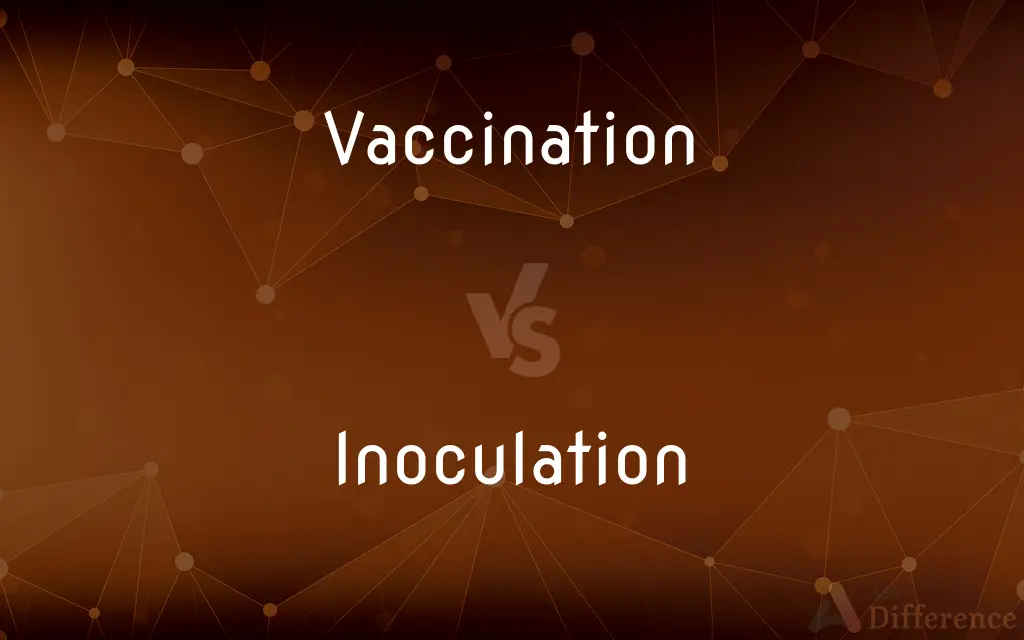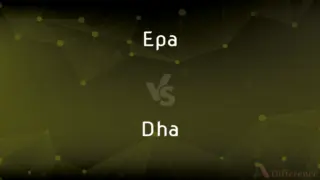Vaccination vs. Inoculation — What's the Difference?
By Tayyaba Rehman — Updated on December 25, 2023
Vaccination is administering a vaccine to stimulate an immune response against a specific disease, while inoculation is a broader term for introducing an antigen into the body.

Difference Between Vaccination and Inoculation
Table of Contents
ADVERTISEMENT
Key Differences
Vaccination specifically involves administering a vaccine, which contains an agent resembling a disease-causing microorganism. This agent is often a weakened or killed form of the microbe, its toxins, or one of its surface proteins. Inoculation, on the other hand, is a more general term for introducing any substance into the body to provoke an immune response or for other scientific purposes.
The purpose of vaccination is to stimulate the body's immune system to recognize the agent as a threat, destroy it, and remember it, so the immune system can more easily recognize and destroy any of these microorganisms it later encounters. In contrast, inoculation can include the introduction of various substances into the body, not necessarily to provoke an immune response but sometimes for other medical or experimental purposes.
Vaccination is a critical tool in preventing infectious diseases and has led to the eradication of diseases like smallpox. Inoculation can also be used in a broader sense in contexts like microbiology or agriculture, where it might involve introducing microorganisms into a new environment to study their effects.
Vaccines are developed specifically for diseases and are rigorously tested for safety and efficacy. Inoculation, as a broader term, covers a range of practices from traditional medicine to modern scientific research and can involve a variety of biological materials.
In summary, while vaccination is a subset of inoculation focused specifically on preventing disease through immune response, inoculation encompasses a wider range of practices including but not limited to vaccination.
ADVERTISEMENT
Comparison Chart
Definition
Administering a vaccine to stimulate an immune response.
Introducing a substance into the body for various purposes.
Primary Purpose
To prevent specific diseases by creating immunity.
Broader range, including study, research, or treatment.
Types of Agents Used
Weakened or inactive parts of a pathogen, or its proteins.
Can be any biological material, not just pathogens.
Focus
Primarily on preventing infectious diseases.
Includes a variety of scientific and medical applications.
Historical Significance
Key in eradicating and controlling many diseases.
Used in broader contexts, including early forms of disease prevention.
Compare with Definitions
Vaccination
Vaccination is the act of administering a vaccine to prevent disease.
The children received a measles vaccination before starting school.
Inoculation
Inoculation involves introducing a substance into the body.
Inoculation in the lab was used to study the bacteria's effects.
Vaccination
Vaccines are developed for specific diseases.
He received a vaccination against hepatitis B.
Inoculation
It can be for research, treatment, or preventive measures.
The scientist's inoculation of cells was part of a cancer study.
Vaccination
Vaccination is a preventive healthcare measure.
Regular vaccination is crucial for maintaining public health.
Inoculation
Inoculation can introduce various biological materials.
The inoculation of soil with beneficial microbes improved plant growth.
Vaccination
It aims to induce long-term protection against diseases.
The COVID-19 vaccination provided long-lasting immunity to many.
Inoculation
It includes traditional and modern scientific practices.
Early inoculation practices were precursors to modern vaccines.
Vaccination
It introduces a weakened pathogen to stimulate immunity.
Her flu vaccination helped her body build immunity against the virus.
Inoculation
Inoculation has a broader application than vaccination.
Inoculation of plants is used in agricultural research.
Vaccination
Vaccination is the administration of a vaccine to help the immune system develop protection from a disease. Vaccines contain a microorganism or virus in a weakened, live or killed state, or proteins or toxins from the organism.
Inoculation
Inoculation is a set of methods of artificially inducing immunity against various infectious diseases. The terms inoculation, vaccination, and immunization are often used synonymously, but there are some important differences among them.
Vaccination
Treatment with a vaccine to produce immunity against a disease; inoculation
If you think you need a flu vaccination, check with your doctor
Vaccination against yellow fever is essential
Inoculation
The act or an instance of inoculating, especially the introduction of an antigenic substance or vaccine into the body to produce immunity to a specific disease.
Vaccination
Inoculation with a vaccine in order to protect against a particular disease.
Inoculation
(immunology) The introduction of an antigenic substance or vaccine into the body to produce immunity to a specific disease.
Vaccination
A scar left on the skin by vaccinating.
Inoculation
(microbiology)Microbiology The introduction of a microorganism into a culture medium.
Vaccination
Inoculation with a vaccine, in order to protect from a particular disease or strain of disease.
Inoculation
The insertion of the buds of one plant into another; grafting.
Vaccination
The act, art, or practice of vaccinating, or inoculating with the cowpox, in order to prevent or mitigate an attack of smallpox. Cf. Inoculation.
Inoculation
An inoculum; that which is inoculated.
Vaccination
Any inoculation intended to raise immunity to a disease.
Inoculation
The act or art of inoculating trees or plants.
Vaccination
Taking a vaccine as a precaution against contracting a disease
Inoculation
The act or practice of communicating a disease to a person in health, by inserting contagious matter in his skin or flesh, usually for the purpose of inducing immunity to the disease.
Vaccination
The scar left following innoculation with a vaccine
Inoculation
Fig.: The communication of principles, especially false principles, to the mind.
Inoculation
The introduction of microorganisms into a growth medium, to cause the growth and multiplication of the microorganisms.
Inoculation
Taking a vaccine as a precaution against contracting a disease
Common Curiosities
Can inoculation be used in agriculture?
Yes, inoculation is used in agriculture to introduce beneficial microbes to plants.
How do vaccines work?
Vaccines work by stimulating the immune system to recognize and combat specific pathogens.
What diseases can be prevented by vaccination?
Vaccination can prevent diseases like measles, polio, influenza, and COVID-19.
Are there side effects to vaccination?
Some people may experience mild side effects like soreness or low-grade fever after vaccination.
Is inoculation the same as immunization?
No, immunization is the process of becoming immune, often as a result of vaccination or inoculation.
What is the purpose of inoculating lab cultures?
Inoculating lab cultures is done to grow and study microorganisms under controlled conditions.
Is inoculation only used for disease prevention?
No, inoculation can be used for disease prevention, research, or even treatment in some cases.
Are vaccinations safe for children?
Yes, vaccinations are generally safe and recommended for children, following proper guidelines.
Can adults receive vaccinations?
Yes, adults can and should receive certain vaccinations, like the flu shot.
Can inoculation be used to treat allergies?
Yes, certain types of inoculation can be used in allergy desensitization therapy.
How often should one get vaccinated?
The frequency depends on the vaccine; some require boosters while others are one-time.
Why is vaccination important in public health?
Vaccination is key in preventing outbreaks and eradicating diseases, thus protecting public health.
What is herd immunity and how does vaccination contribute to it?
Herd immunity occurs when enough people are immune to a disease, reducing its spread. Vaccination significantly contributes to this.
What materials are used in inoculation?
Inoculation can use various materials, including bacteria, viruses, and other biological agents.
Can inoculation involve harmful substances?
Inoculation in a controlled setting can involve potentially harmful substances for research purposes.
Share Your Discovery

Previous Comparison
Epa vs. Dha
Next Comparison
Labneh vs. LabanAuthor Spotlight
Written by
Tayyaba RehmanTayyaba Rehman is a distinguished writer, currently serving as a primary contributor to askdifference.com. As a researcher in semantics and etymology, Tayyaba's passion for the complexity of languages and their distinctions has found a perfect home on the platform. Tayyaba delves into the intricacies of language, distinguishing between commonly confused words and phrases, thereby providing clarity for readers worldwide.














































